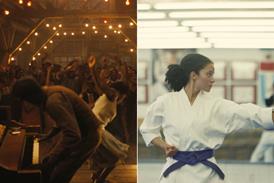It was a day of fiery pressconferences in Venicewith Oliver Stone, Paul Verhoeven and Spike Lee allpresenting new films. A belligerent and upbeat Stone, on the Lido with World Trade Center, surprised onlookersby attacking the "cultural problem" of violence in US movies,chastising films such as Black Hawk Down and Pearl Harbor for "promotingshock and awe" and "worshipping the machinery of war."
Flanked by William Jimeno and John McLoughlin, the New Yorkcops whose miraculous escape from the rubble of the Twin Towersinspired his movie, Stone also strongly defended his decision not to explorethe political ramifications of 9/11.
"There was no room. These men sitting with me and their wives have neverexpressed their political feelings and their sentiments. That is anothermovie...maybe one day I would be privileged enough to do it."
The filmmaker and Vietnamveteran added that it would be wrong for him "to become politicallycorrect at this stage of my life" or to foist his own political opinionsonto the film.
World Trace Center has alreadygrossed more than $60m in the USsince being released by Paramount three weeksago. Stone attributed its success to the universality of its themes. "I feelthat people are going to respond because it is of the heart," he said. "Itcould happen in Madrid, it could be a tsunamiin South-East Asia. It's about people at theedge of death facing adversity and finding the courage, connection and heart tosurvive."
Immediately after Stone left the stage, he was succeeded by Paul Verhoeven. The Dutch director took an altogether morepessimistic view of human nature. His new film Black Book is set in the Netherlands during the last days ofthe Nazi occupation. It portrays brutal behaviour onevery side: from the Nazis, the resistance fighters, the liberated Dutch andthe Allies alike.
"Human beings, be they Americans or Dutch - or probably even the Italians- they are all the same. In these circumstances, there is a rudeness andcruelty that is predominant in the human being," Verhoevensaid.
Black Book is currently being circledby US buyers. Producer San Fu Maltha is confident ofsecuring an American deal either in Venice or inToronto. Verhoeven, meanwhile, has expressed his relief at workingback in Europe after his long sojourn in Hollywood."It is true that after my last film in Los Angeles, which was Hollow Man, I felt as empty as the movie. I was trying to findsomething that was attractive to me personally, soul-wise and closer to theheart. I wanted to stay away from special effects."
Next up on stage, Spike Lee launched a bitter assault on the Bushadministration for its response to Hurricane Katrina in New Orleans. Lee's four hour HBO-backeddocumentary, When The Levees Broke, A Requiem In Four Acts,was broadcast on US TV shortly prior to its screening in Venice.
Lee is now seeking European theatrical distribution for the film. Meanwhile, heis rushing the DVD release in the US. "We're going to makethousands of copies available to the schools, colleges and universities in theStates. We hope this film starts a movement to quicken the rebuilding of New Orleans."
The one positive Lee drew from the disaster in New Orleanswas the robust reporting of the USmedia. "The media really felt betrayed over weapons of mass destruction,"he said. "Once they felt they got duped by the President, they took theirgloves off and there was an all-out assault on anything the government wassaying."

















No comments yet